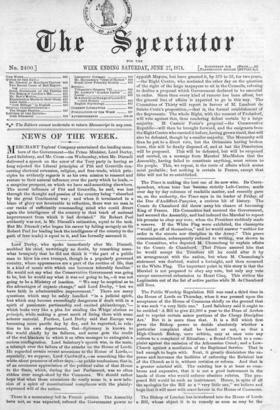Lord Derby, who spoke immediately after Mr. Disraeli, snubbed his
chief, unwittingly no doubt, by remarking some- what brusquely that he did not think it " the part of a public man to blow his own trumpet, though in a popularly governed country, where appearances are a part of the routine of life, that is a kind of music with which one becomes tolerably familiar." He would not say what the Conservative Government was going to be, but he would say what it was not going to be, —it was not going to be a Ministry of inaction. " We may be sceptical as to the advantages of organic change," said Lord Derby, " but we have faith in administrative improvement." There are many questions which may be safely handled "in a judicial spirit, but which may become exceedingly dangerous if dealt with in a spirit of passionate partisanship and excited philanthropy,"— which looks very like a plea for stealing the Whigs' clothes on principle, while making a great merit of lining them with some soberer material. Further, Lord Derby said that Europe was becoming more pacific day by day, and he regretted, in rela- tion to his own department, that/ diplomacy is known to the world chiefly by its failures, and never gets the credit of the wet blankets in which it so often manages to extinguish a serious conflagration. Lord Salisbury's speech was, in the main, a triumph over the failure of the attacks on the House of Lords. He regarded certain recent accessions to the House of Lords,— especially, we suppose, Lord Cardwell's,—as something like the white-sheet penances of other days,—as public confessions, that is, of an erroneous appreciation of the political value of that House to the State, which, during the last Parliament, was so often ridden over rough-shod by the Commons. We should rather hope that what these accessions do really mean is, a new infu- sion of a spirit of constitutional compliance with the plainly- expressed will of the nation.


































